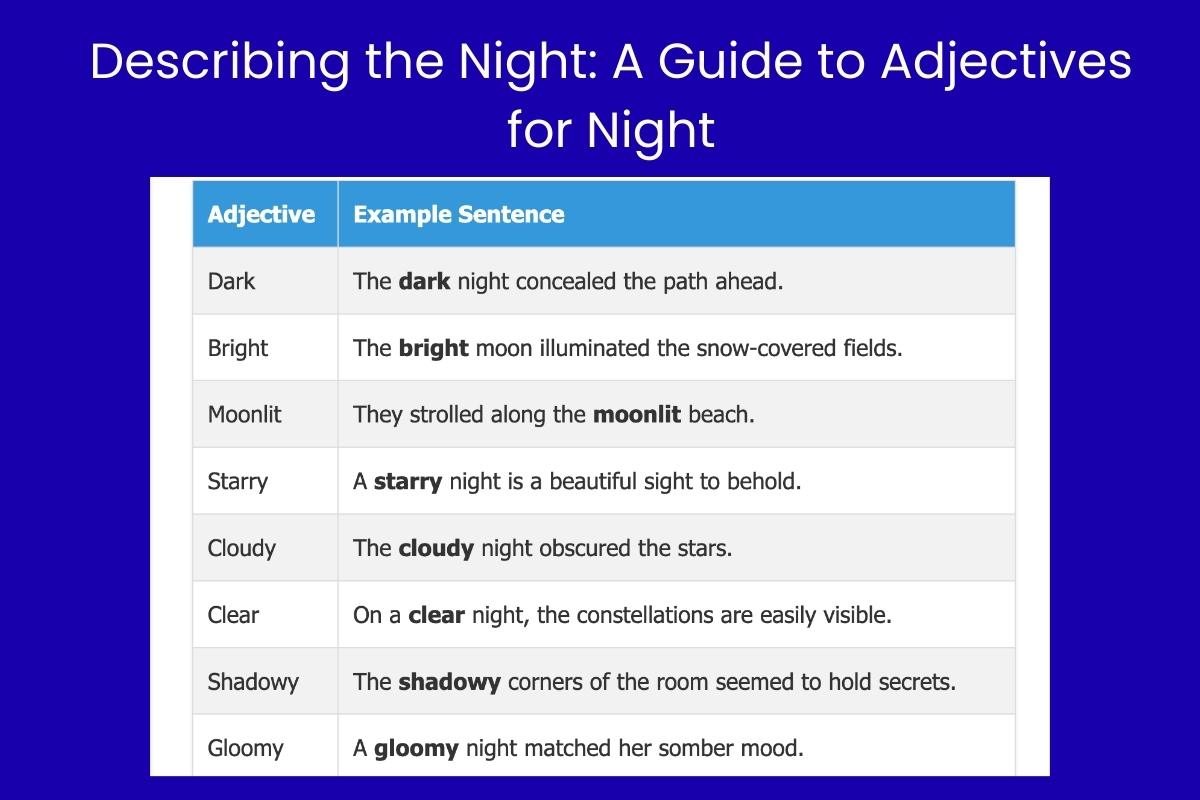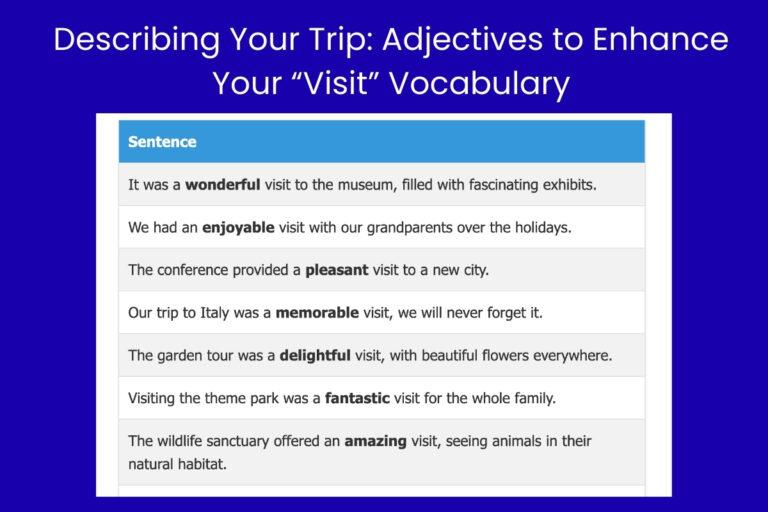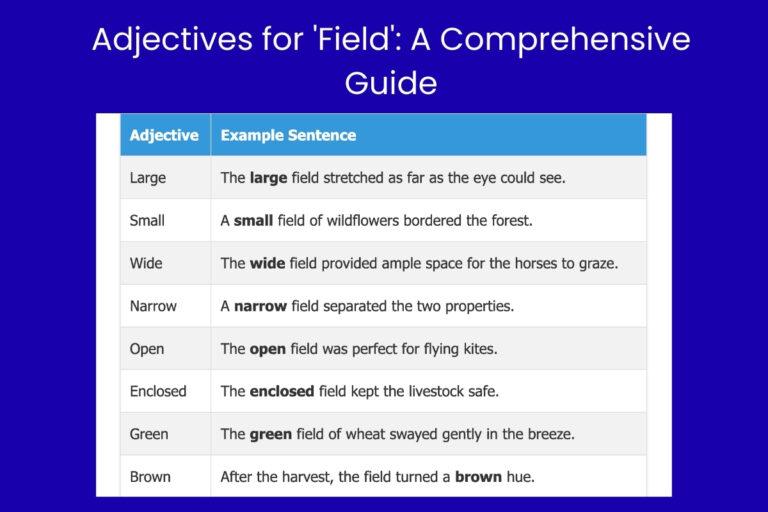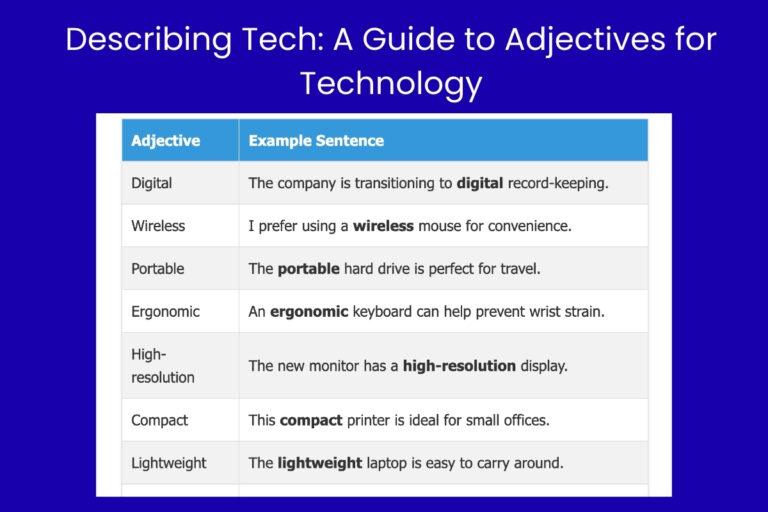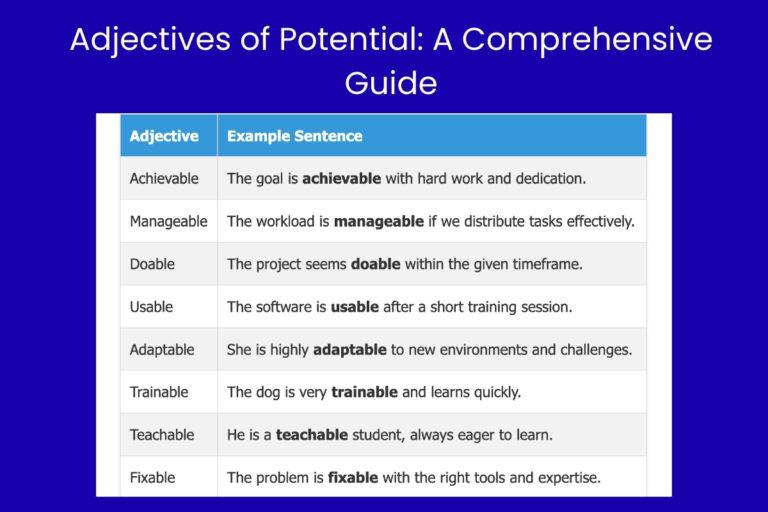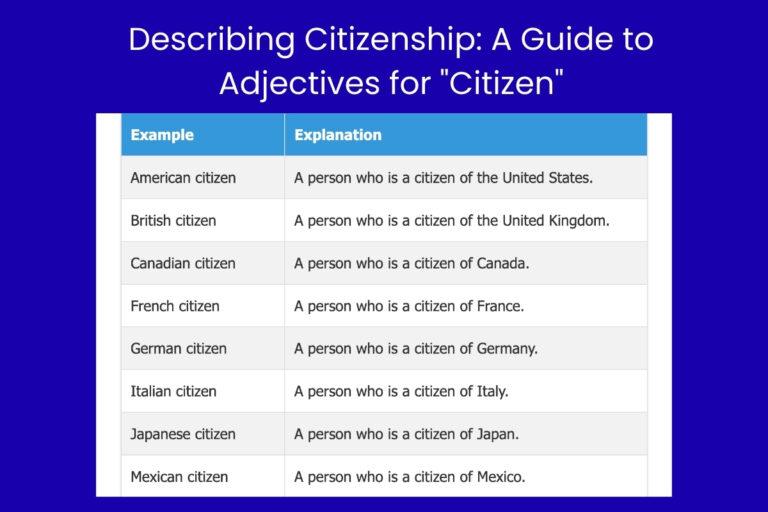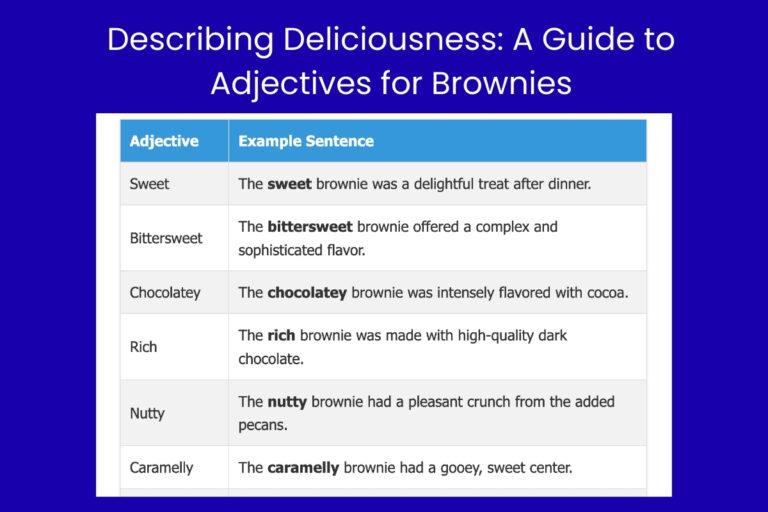Describing the Night: A Guide to Adjectives for Night
The night, a canvas of darkness punctuated by stars and moonlight, holds a unique allure. To capture its essence in writing or speech, a rich vocabulary of adjectives is essential. Choosing the right adjective can transform a simple description into a vivid and evocative portrayal of the nocturnal world. This article explores a wide range of adjectives suitable for describing the night, offering examples, usage rules, and practice exercises to enhance your descriptive skills. Whether you’re a student, writer, or language enthusiast, this guide will equip you with the tools to paint stunning verbal pictures of the night.
This article caters to English language learners of all levels, from beginners seeking basic vocabulary to advanced speakers aiming for nuanced expression. By the end of this guide, you’ll have a deeper understanding of how to use adjectives effectively to bring the night to life in your communication.
Table of Contents
- Definition: Adjectives for Night
- Structural Breakdown of Adjectives
- Types of Adjectives for Describing the Night
- Examples of Adjectives for Night
- Usage Rules for Adjectives
- Common Mistakes with Adjectives
- Practice Exercises
- Advanced Topics: Figurative Language
- Frequently Asked Questions (FAQ)
- Conclusion
Definition: Adjectives for Night
Adjectives are words that describe or modify nouns, providing more information about them. When used to describe the night, adjectives help us convey the specific qualities, characteristics, and feelings associated with this time of day. These adjectives can relate to the darkness, the sounds, the atmosphere, or the emotions the night evokes. They add depth and detail to our descriptions, allowing us to paint a more vivid and complete picture.
The function of adjectives is to enhance the reader’s or listener’s understanding and imagination. By carefully selecting adjectives, we can transform a simple statement like “It was night” into a rich and evocative description, such as “It was a starry and still night.” Adjectives for night can be classified based on what they describe, such as appearance (dark, luminous), sound (silent, rustling), or feeling (peaceful, eerie).
Structural Breakdown of Adjectives
Adjectives typically precede the noun they modify (attributive adjectives), as in “a dark night.” They can also follow a linking verb, such as is, are, was, were, become, or seem (predicative adjectives), as in “The night was dark.” Understanding this structural difference is crucial for using adjectives correctly.
Adjectives can also be modified by adverbs to add further nuance. For example, instead of saying “a dark night,” you could say “a deeply dark night,” where the adverb “deeply” intensifies the adjective “dark.” Furthermore, adjectives can be part of more complex phrases, such as “a night filled with stars,” where the adjective “filled” is part of a participial phrase modifying “night.” Remember that adjectives do not change their form to agree with the noun they modify in English, unlike some other languages.
Types of Adjectives for Describing the Night
Adjectives for describing the night can be categorized based on the type of quality they emphasize. These categories include descriptive, sensory, emotional, and temporal adjectives. Each category offers a different lens through which to view and describe the night.
Descriptive Adjectives
Descriptive adjectives provide factual information about the appearance of the night. They often relate to the level of darkness, the presence of light sources, or the overall visual characteristics. Examples include: dark, bright, moonlit, starry, cloudy, clear, shadowy, gloomy, dim, luminous.
Sensory Adjectives
Sensory adjectives appeal to the senses, describing the sounds, smells, and textures associated with the night. They evoke a more immersive experience for the reader or listener. Examples include: silent, quiet, still, rustling, howling, whispering, chilly, crisp, damp, fragrant.
Emotional Adjectives
Emotional adjectives convey the feelings or mood associated with the night. They reflect the emotional impact the night has on the observer. Examples include: peaceful, eerie, mysterious, romantic, restless, melancholy, serene, frightening, ominous, calm.
Temporal Adjectives
Temporal adjectives relate to the time or duration of the night, or its position within a sequence. Examples include: late, early, long, short, protracted, fleeting, nocturnal, evening, midnight, twilight.
Examples of Adjectives for Night
The following tables provide numerous examples of adjectives for night, categorized by type, to illustrate their usage and meaning.
Descriptive Adjective Examples
This table showcases descriptive adjectives that paint a picture of the night’s appearance, focusing on its darkness, light, and other visual qualities. These are the adjectives that help us “see” the night in our minds.
| Adjective | Example Sentence |
|---|---|
| Dark | The dark night concealed the path ahead. |
| Bright | The bright moon illuminated the snow-covered fields. |
| Moonlit | They strolled along the moonlit beach. |
| Starry | A starry night is a beautiful sight to behold. |
| Cloudy | The cloudy night obscured the stars. |
| Clear | On a clear night, the constellations are easily visible. |
| Shadowy | The shadowy corners of the room seemed to hold secrets. |
| Gloomy | A gloomy night matched her somber mood. |
| Dim | The dim light of the streetlamp barely pierced the darkness. |
| Luminous | Fireflies created a luminous spectacle in the forest. |
| Pitch-black | The cave was enveloped in a pitch-black night. |
| Overcast | An overcast night threatened rain. |
| Twinkling | The twinkling stars danced in the sky. |
| Radiant | A radiant moon shone down on the city. |
| Pale | The pale moonlight gave the landscape an ethereal glow. |
| Silvery | The lake reflected the silvery light of the moon. |
| Murky | A murky night made navigation difficult. |
| Dusky | During the dusky hours, the world seemed to transform. |
| Glimmering | The distant city lights were just glimmering points in the distance. |
| Brilliant | A brilliant night, perfect for stargazing. |
| Opaque | The opaque night sky hid the stars from view. |
| Translucent | A thin layer of clouds created a translucent night sky. |
| Veiled | The moon was veiled by a thin layer of clouds. |
Sensory Adjective Examples
This table presents sensory adjectives that focus on the sounds, smells, and tactile sensations of the night. These adjectives engage the reader’s senses, creating a more immersive and realistic experience.
| Adjective | Example Sentence |
|---|---|
| Silent | The silent night was broken only by the hooting of an owl. |
| Quiet | A quiet night descended upon the town after the day’s bustle. |
| Still | The still night air was heavy with anticipation. |
| Rustling | The rustling leaves hinted at a gentle breeze. |
| Howling | A howling wind swept through the mountains. |
| Whispering | The whispering pines seemed to share secrets. |
| Chilly | A chilly night air made her shiver. |
| Crisp | The crisp night air invigorated him. |
| Damp | A damp night made the cobblestones slick. |
| Fragrant | The fragrant night air was filled with the scent of jasmine. |
| Echoing | The echoing sounds of the city resonated through the night. |
| Murmuring | A murmuring stream flowed through the forest. |
| Creaking | The creaking branches sounded ominous in the dark. |
| Noisy | A noisy night in the city made it hard to sleep. |
| Scented | A scented night, filled with the aroma of blooming flowers. |
| Cool | A cool night offered respite from the summer heat. |
| Breezy | A breezy night made the flags flutter. |
| Humid | The humid night air felt heavy and oppressive. |
| Balmy | A balmy night, perfect for a walk on the beach. |
| Stinging | A stinging wind whipped across the open fields. |
| Scratching | The scratching sounds outside the window kept me awake. |
| Soft | A soft breeze made the night feel gentle. |
| Velvety | The velvety darkness enveloped everything. |
Emotional Adjective Examples
This table contains emotional adjectives that express the feelings and moods associated with the night. These adjectives add a layer of emotional depth to your descriptions, making them more relatable and impactful.
| Adjective | Example Sentence |
|---|---|
| Peaceful | A peaceful night offered a welcome respite from the day’s chaos. |
| Eerie | An eerie night settled over the abandoned house. |
| Mysterious | The mysterious night held secrets waiting to be uncovered. |
| Romantic | A romantic night under the stars was the perfect setting for their date. |
| Restless | A restless night made it hard to fall asleep. |
| Melancholy | A melancholy night reminded her of lost loves. |
| Serene | The serene night calmed her troubled mind. |
| Frightening | A frightening night was filled with strange noises. |
| Ominous | The ominous night seemed to foreshadow dark events. |
| Calm | A calm night settled over the lake. |
| Haunting | A haunting night, filled with memories of the past. |
| Tranquil | The tranquil night soothed her nerves. |
| Foreboding | A foreboding night made him uneasy. |
| Unsettling | An unsettling night, full of strange occurrences. |
| Comforting | A comforting night wrapped her in a sense of security. |
| Soothing | The soothing night sounds lulled him to sleep. |
| Isolated | The isolated night amplified his loneliness. |
| Hopeful | A hopeful night, promising a better tomorrow. |
| Desolate | The desolate night mirrored his inner emptiness. |
| Enchanting | An enchanting night, filled with magic and wonder. |
| Oppressive | The oppressive night weighed heavily on his spirits. |
| Welcoming | A welcoming night, offering solace and rest. |
| Dreamlike | The dreamlike night blurred the line between reality and fantasy. |
Temporal Adjective Examples
This table provides temporal adjectives that describe the time or duration of the night. These adjectives help to place the night within a specific timeframe or sequence of events.
| Adjective | Example Sentence |
|---|---|
| Late | It was a late night, and everyone was tired. |
| Early | The early night sky was still tinged with the colors of sunset. |
| Long | A long night stretched ahead of them. |
| Short | It was a short night because of the summer solstice. |
| Protracted | A protracted night of storms kept everyone awake. |
| Fleeting | The fleeting night passed quickly. |
| Nocturnal | The nocturnal animals emerged from their burrows. |
| Evening | The evening night began as the sun dipped below the horizon. |
| Midnight | The clock struck, signaling the start of the midnight night. |
| Twilight | The twilight night was a beautiful transition between day and night. |
| Preceding | The preceding night had been uneventful. |
| Subsequent | The subsequent night brought more rain. |
| Ongoing | The ongoing night felt endless. |
| Impending | The impending night filled him with dread. |
| Daytime | Though it was daytime, the cave felt like night. |
| Lunar | The lunar night was illuminated by the moon’s glow. |
| Solar | During the solar night of the eclipse, the world went dark. |
| Dawning | The dawning night signaled the end of the storm. |
| Fading | The fading night gave way to the first light of dawn. |
| Weekly | The weekly night market was a popular attraction. |
Usage Rules for Adjectives
Using adjectives correctly involves understanding their placement, modification, and agreement (though English adjectives don’t change form based on the noun). Here are some key rules:
- Placement: Adjectives usually precede the noun they modify (e.g., “a dark sky”). However, they follow linking verbs (e.g., “The sky is dark“).
- Order: When using multiple adjectives, there’s a general order to follow: opinion, size, age, shape, color, origin, material, purpose (e.g., “a beautiful large old round blue French wooden dining table”). This order isn’t strict, but it sounds more natural.
- Coordination: When using two or more adjectives of equal importance, separate them with commas (e.g., “a dark, stormy night”). If the last adjective is closely linked to the noun, use “and” (e.g., “a dark and stormy night”).
- Modification: Adjectives can be modified by adverbs to intensify or qualify their meaning (e.g., “a very dark night,” “a slightly eerie night”).
Exceptions and Special Cases: Some adjectives are always used predicatively (after a linking verb), such as afraid and asleep. You wouldn’t say “an afraid child,” but rather “the child is afraid.” Also, some nouns can function as adjectives (e.g., “night vision”), but they don’t follow the same rules as true adjectives.
Common Mistakes with Adjectives
Here are some common mistakes to avoid when using adjectives:
| Incorrect | Correct | Explanation |
|---|---|---|
| The night was darkly. | The night was dark. | Adjectives, not adverbs, follow linking verbs to describe the subject. |
| A dark stormy and night. | A dark and stormy night. | The word order should be correct, and a comma is not necessary before “and”. |
| Very much dark night. | A very dark night. | Adverbs modify adjectives, and the article “a” is necessary before “very.” |
| Night vision is good. | My night vision is good. | While “night” can act as an adjective, it’s important to use possessives or articles to provide context. |
| The child is asleeping. | The child is asleep. | “Asleep” is a predicative adjective and doesn’t need the ‘-ing’ form. |
Practice Exercises
Test your understanding of adjectives for night with these practice exercises. Choose the best adjective to complete each sentence.
| Question | Answer |
|---|---|
| 1. The ________ night sky was filled with countless stars. | Starry |
| 2. A ________ silence descended upon the forest. | Profound |
| 3. The ________ wind howled through the empty streets. | Eerie |
| 4. The ________ moonlight cast long shadows across the lawn. | Pale |
| 5. It was a ________ night, perfect for a romantic stroll. | Balmy |
| 6. The ________ darkness made it difficult to see. | Opaque |
| 7. The ________ night was broken only by the sound of crickets. | Silent |
| 8. A ________ fog rolled in, obscuring the city lights. | Damp |
| 9. The ________ night air carried the scent of pine. | Crisp |
| 10. It was a ________ night, and I couldn’t wait to go home. | Late |
| 11. The ________ night seemed to whisper secrets in the wind. | Mysterious |
| 12. A ________ glow emanated from the distant lighthouse. | Glimmering |
| 13. The ________ night amplified her sense of loneliness. | Desolate |
| 14. A ________ calm settled over the city as everyone slept. | Peaceful |
| 15. The ________ creatures of the night emerged from their hiding places. | Nocturnal |
| 16. A ________ sky suggested an approaching storm. | Overcast |
| 17. The ________ hour approached, filling him with anticipation. | Midnight |
| 18. He enjoyed the ________ feel of the night air against his skin. | Cool |
| 19. The ________ scent of jasmine filled the air. | Fragrant |
| 20. It was a ________ experience, walking through the forest at night. | Enchanting |
Advanced Topics: Figurative Language
For advanced learners, exploring figurative language can elevate your descriptions of the night. Metaphors, similes, and personification can add depth and creativity to your writing.
- Metaphor: “The night was a black velvet curtain.” (Compares the night to a black velvet curtain without using “like” or “as”).
- Simile: “The stars shone like diamonds scattered across the sky.” (Compares the stars to diamonds using “like”).
- Personification: “The night whispered secrets to the trees.” (Gives the night human qualities).
Using adjectives in combination with figurative language creates powerful imagery. For example, “The eerie night whispered secrets,” combines an emotional adjective with personification to create a haunting image. Experiment with different combinations to find your unique voice.
Frequently Asked Questions (FAQ)
- What is the difference between an adjective and an adverb?
Adjectives modify nouns, while adverbs modify verbs, adjectives, or other adverbs. For example, in “a dark night,” dark is an adjective describing the noun night. In “The moon shone brightly,” brightly is an adverb describing how the verb shone was performed.
- Can a noun be used as an adjective?
Yes, nouns can sometimes function as adjectives, often called attributive nouns. For example, in “night vision goggles,” night acts as an adjective describing vision goggles. However, nouns used as adjectives don’t follow all the same rules as true adjectives.
- How do I choose the right adjective for “night”?
Consider what aspect of the night you want to emphasize. Do you want to describe its appearance (dark, starry), its sounds (silent, rustling), or the feelings it evokes (peaceful, eerie)? Choose an adjective that accurately and effectively conveys your intended meaning.
- Is there a limit to how many adjectives I can use to describe a noun?
While there’s no strict limit, using too many adjectives can make your writing sound cluttered and awkward. Aim for clarity and conciseness. Choose the most impactful adjectives and avoid redundancy.
- What is the correct order of adjectives when using multiple adjectives?
The general order is: opinion, size, age, shape, color, origin, material, purpose. For example: a beautiful large old round blue French wooden dining table. However, this order is flexible, and you can adjust it for emphasis or stylistic effect.
- How can I improve my vocabulary of adjectives for describing the night?
Read widely, paying attention to how authors use adjectives to create vivid descriptions. Use a thesaurus to find synonyms and expand your options. Practice writing descriptions of the night, experimenting with different adjectives to see how they change the effect.
- Are some adjectives more formal or informal than others?
Yes, some adjectives have a more formal or literary tone, while others are more casual. For example, luminous is more formal than bright, and eerie is more formal than creepy. Consider your audience and the context when choosing adjectives.
- What are some common adjective suffixes and prefixes to create night-related words?
Common suffixes include “-ly” (nightly), “-ed” (moonlit), “-less” (starless). Prefixes are less common but can include “pre-” (pre-night) in specific contexts. These can help create new or nuanced descriptions.
Conclusion
Mastering the art of using adjectives to describe the night is a valuable skill for anyone seeking to improve their English language proficiency. By understanding the different types of adjectives, their usage rules, and common mistakes to avoid, you can create vivid and evocative descriptions that capture the essence of the nocturnal world. Remember to practice regularly, expand your vocabulary, and pay attention to how skilled writers use adjectives effectively.
The night offers endless possibilities for descriptive writing. By embracing the tools and techniques outlined in this guide, you can transform your words into captivating images, bringing the beauty, mystery, and emotion of the night to life for your readers. So, go forth and paint the night with your words!
